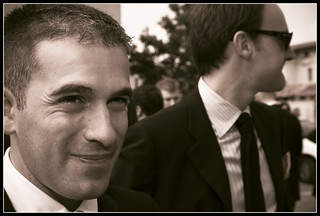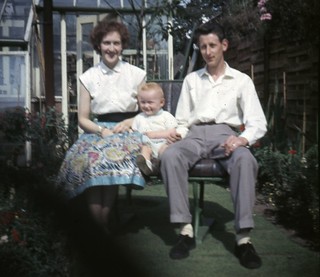Guyside: How old = not giving a crap anymore?
When I was a kid, I was a shy kid. Not shy enough to be tortured by loneliness. But a bit shy in specific contexts. I was fine playing saxophone in a concert band or in a marching band. I was cool with speaking in public or being part of the debating society. I would speak up in class, even crack a joke from time to time.
But there were things that just hit all my buttons. I first took guitar lessons when I was about 11. But other than an awkward and brief performance to get my one and only Cub Scout badge (before I quit for unrelated reasons), I went through YEARS where I only played in my room. And I NEVER sang.
That years was actually decades. And then, things changed. Why? Well… the summer I turned 40 I got diagnosed with bladder cancer. That was not a good summer. And one of the things that I decided to do to follow my heart a little more, to stop putting off ’til someday, was to start hosting house concerts. Those are gatherings in which you invite a professional musician to perform a show in your house, then invite friends, neighbours and colleagues to come and pay the performer for his or her or their work.
Once we decided to do that, we set a date in February, my partner’s birth month. And then I decided to open the show with a couple of songs. Which I had never done before. Not an open-mike night, not a house party, not a campfire.
It was one of the most frightening experiences of my life. I stood in front of my partner, some of her and our friends, her colleagues, with a guitar and an amp and a microphone in front of my mouth and tried to get through two songs. It was petrifying.
I still struggle with stage fright. But I’ve done a fair amount of playing in front of other people since then. A few years after that, we were on our way to a friend’s cottage for a long weekend. “Bring a guitar,” he said. “We’ve never had a guitar at our cottage!”
One afternoon that weekend, I found myself on the dock, sitting in a Muskoka chair, noodling around and singing, my eyes closed against the sun’s rays. When I stopped and looked around, our host’s two teenage daughters and their friends were clustered around me. I then realized why smarter teenage boys than me played guitar in PUBLIC, and not in their rooms.
So what’s the point of all this? Well, for the last few weeks, I’ve been raising money for a two-day cycle trip that raises money for cancer research. As part of my fundraiser, I’ve been thanking people who donate more than $100 by finding a song with their name in it, learning it, and recording a Youtube video of it for them on ukulele. That’s led to a story in the local paper, and now to me being asked to do a 15-minute set at a local club as part of another fundraising concert. At a club that calls itself legendary. Yerk.
I still get stage butterflies, and probably always will. But I mostly don’t give a crap. I acknowledge the feelings of anxiety and the fear that I’m going to screw up onstage so badly that I’ll make an ass of myself as simply that — feelings and fears. And it’s happened, for sure. I just give much less of a crap about that possibility.
I have had some help learning those lessons, because the fear of screwing up catastrophically has run through other aspects of my life and led to some bad mistakes. But part of it has just been getting older and realizing that in a lot of cases… it doesn’t matter if you screw up. If I get the chord changes wrong or forget a line at Acoustics for Cancer Awareness, is someone going to ask for their money back? Will they think I’m a horrible person? Probably not. And if they do, imagine what a jerk that makes them!
And the greatest irony of giving less of a crap? Usually, the performance is better. I don’t mean to say we should not strive for excellence, or that we shouldn’t care about performance. But sometimes you just gotta do it and — at least beforehand — stop caring about the end result. Since we’re all getting a bit older, why don’t you join me in giving a crap about fewer and fewer things? It’ll do you good.
Read MoreGuyside: An honorable man
If I needed proof I was getting older, it came when I started into a level of crankiness that gradually built to the point where all I needed was a pair of reading glasses on the end of my nose and a walking stick to shake while inveighing against “those kids.”
Whether it’s bad luck, the randomness of the universe, or some sign of an actual trend, I’ve been seeing a lot of things lately about sexual assault in online or “geek” culture recently, and it’s getting me angry. There seems a predictable pattern to it: first, a woman writes or says something about … well, it could be almost anything. One example is Janelle Asselin’s critique of a comic book called Teen Titans. Then, a dense cloud of misogyny and ad feminem attacks follows like a cloud of gnats around a hiker. In this case, here’s an essay about what happened to Asselin after she wrote the critique.What happens after that? Usually, we all (we being neither the woman it’s happening to, nor her friends, nor the misogynists who are being misogynist) forget about it.
This hasn’t come out of nowhere. I remember when one of my favorite bloggers went underground after truly horrifying threats and comments were rained down upon her. But as the years go by, I’m finding it more and more difficult to forget about this stuff, to “get past it.” The words and threats that pop up online exist in the “real world.” There’s no shortage of men who seem to hate and fear women. But when you combine these attitudes with the anonymity that can be offered up by the online world, it can be utterly heinous.
So what is to be done? A few things, I think. The first is to not propagate these attitudes. To think about the way in which you as a man interact with women, how you agree, how you disagree, and how you debate. I disagree with women all the time, and I have a remarkable range of ways I can do that without reducing them to their genitalia or threatening them with sexual assault.
The second thing you can do is support women in your life who are subjected to this behavior. At the very least, those of us who are not trolls need to be there for our friends when they are being threatened and harassed.
The third step is the one that seems more difficult for many people: speak out. When you see this happening, tell the person that what they’re doing is wrong. If a woman is being threatened with rape for having the temerity to voice an opinion — that’s wrong. Say so. Publicly.
There are lots of attitudes that I would prefer didn’t exist at all in this world. But that can’t happen with the snap of a finger. If our society is going to become more egalitarian, laws won’t do it; changing minds will. One step in that is telling the trolls that we see them and we won’t tolerate their behavior. Edmund Burke wrote “When bad men combine, the good must associate.”
When I was a younger man, I suspect I was a bit more reticent about my views. But now? I give much less of a shit. I plan on being as vocal as I can when I see women being silenced by threats of rape and violence. I hope you will too.
Read MoreAging parents, aging us

Do different generations stay different? Do we replicate the patterns of our parents, or do we make different choices?
Like many people my age, I have aging parents. In my case, that’s a mom approaching her 90s with some medical challenges and the difficult adjustment of living alone for the first time in her adult life. It’s a struggle, and I think it has forced her and her two sons to face up to some uncomfortable truths over the last few years, particularly since my dad died in the summer of 2012.
One of those: how I will confront the inevitabilities of old age (if I am fortunate enough to get there). For my parents’ generation, it was common for parents to be taken care of by one or more of their children, either in the family home or by moving into a child’s home. There was (is?) a stigma about nursing homes and retirement homes. My mother has chosen to stick it out as long as is possible in her home, the home she was born in. But unlike her parents, she doesn’t have a child who will “take care of her.” I live a 90-minute flight away, my brother is six hours away by car. Thanks to my father’s service in the Second World War, she receives a number of services that have allowed her to stay in her house — the house her grandfather bought and had moved onto the property before the Great Depression — despite the encroachments of age on her body.
For people in my generation, the rules are a bit different. I have no children to rely on. I expect that any support that my partner or I will need as we age won’t be provided by family members, but by paying people from our retirement savings and investments. While I love our house, I think that when the time comes for us to retire I’ll be able to sell it and leave with no great emotional wrench; including our house, I’ve lived in about seven different places in my adult life, and I think I’ll be able to move again.
But things have been different for my generation for a while. Here I am, typing this in a pair of jeans and a t-shirt with a graphic representation of Stephen King’s “Dark Tower” series. I never saw my dad with a pair jeans (what he would call dungarees) on or a t-shirt in my lifetime. My partner doesn’t wear housecoats like my mom does, or consider the maintenance of an immaculate home a key goal, as her mom and mine do. She works outside the home, while my mom gave up her job as a nurse in ’53, when she married, and never collected another paycheque.
We are — or at least I think we seem — “younger” than our parents at the same age. We go to concerts by loud bands, we dress differently, we participate in different recreational and sporting activities, we expect that our lives will be characterized by being and acting young for a long, long time. Thinking of Shakespeare’s seven ages, we’re unwilling to enter the fifth age, of justice and solemnity. We want to be lovers and soldiers forever.
So when we age, will we really be different from our parents? Will our expectations be different; will we make different choices? Or am I flattering myself by thinking that I’ll make other choices, better choices?
It’s easy to tell yourself that you know better than the “old folks.” But those better decisions and more logical choices are much easier to make in the world of the distant future than in the world of the cold present.
It seems to me that the real challenge for us all is to strike the constantly shifting balance between independence and dependence, between insulating our elders from danger and allowing them to live as they choose, between being determined and being bullheaded, between giving in and denying reality, between taking responsibility for our health and accepting support when offered. There’s no magic formula, no easy answer.
(photo: cc-licenced by Flickr user Lars Ploughmann)
Read MoreGuyside: Don’t sell friendship short
You know how we have little routines that we rely on in conversations? Someone brings up air travel and you have your little shpiel about it. Well, one of mine has always been that women’s relationships are like cats interacting with each other: much sizing up and marking of territory. I’ve also said that men’s friendships get formed like dogs’ — we sniff each other’s butts, then we figure out if the person in question is someone we want to play with.

Male friendship can sometimes be discounted, even by the friends themselves.
It might make a marginally funny line, but I’ve come to believe it sells both men and women short in the friendship department.
I currently don’t really have a “best friend.” There are guys that I’m close with, that I’ve been with through good times and bad times, but not a single person I’d tell people, “oh, you know ?Steve? Yeah, he’s my best friend.”
A few years ago, I had someone I considered a best friend. He and I had begun as colleagues, and had immediately gravitated to each other. My partner and his wife also got along, and we found ourselves as a foursome often, but we also were “guy friends”.
The friendship ended for a number of reasons that probably don’t really matter in this context, and anyway, I don’t think it would be right to go into them. The best way I can say it that I ended it because I was no longer comfortable with being his friend.
That was a few years ago, and since that time we’ve exchanged a few words and seen each other at a few events. It’s led to some awkwardness from time to time, probably on several people’s parts — we still share a number of friends.
And on Sunday night, we found each other at a large surprise party celebrating one of those friends’ 80th birthday, and my ex-friend found a moment to tell me that he missed the friendship. I found myself uncharacteristically incoherent, blabbed out a few loosely connected words, and made myself scarce. It was a very awkward moment for me.
I suspect that were I to reach out to reconnect, it might well be received well by my ex-friend. But even if I did, it might not work out. During the years of our ‘estrangement’, things have changed for me. As I said to someone this week, I feel as if the me he knew, who was his friend, isn’t there anymore. So even if I was willing to remake the friendship, it wouldn’t necessarily be the same friendship.
Another part of me thought about all this and wanted to dismiss the thought process itself as a bit much of a muchness, as too much rumination about a friendship. But I don’t agree with that. And I think that while it can be easy for men to think of our friendships as activity-based or transactional (hey, let’s go running, let’s go out for beers, let’s hit a concert), there’s something more to men’s friendships.
It’s easy to focus on our primary relationship — our wife, our partner, whatever the label is. I think it’s common for men to sometimes forget that there are benefits to ourselves and to the people we care about when we build stronger social bonds with other people, whether we have a best friend or a number of friends.
When it comes to emotional resilience, to mutual support, and to good psychological health, friendship is definitely NOT where you want to put all your eggs in one basket.
I miss what I had. But you can’t go back — or at least I can’t; better to build relationships that can be ones of mutual support and positive regard.
Photo: CC licenced by Flickr user Francesco Rachello
Read MoreGuyside: Dealing with aging parents, guyside style.

As parents age, we have to move from being “their child” to mutual independence to their dependence on us. It’s not always easy.
One of the things about getting to this age (in my case, 47) is that you get the odd experience of parenting your parents.
I was about the last child in my generation. With both parents near the end of large families, I have a ton of cousins, many of whom are well into retirement by now. And as a late child (born to 41-year-olds), my mom (and my dad, until his death in 2012) is well into seniorhood.
It’s probably no surprise that the dynamics change when your parents age. As a child, we strive for independence from our parents. That lasts for some time and then, like a wave collapsing in on itself and running back into the ocean, dependence begins to reach back out from your parents to you.
Things that were easily done for years become more difficult. It becomes more challenging for the senior citizen to take on some of the frustrations of daily living. And if physical illnesses encroach, as they almost certainly will, that process can accelerate more and more as time goes on.
So here, from my own experience and with the help of some references I’ve found, are some tips for dealing with aging parents:
- Find ways to detach emotionally just a bit. It’s difficult to hear a parent in emotional or health difficulty. But if your emotions take over, it’s going to be difficult to truly help them. Create an outlet for your emotions, but then work on logic.
- Sometimes just listening is enough. As a guy, I know only too well I can jump to SOLVING THE PROBLEM. But sometimes, your parent won’t want a solution; they’ll want a set of ears.
- Talk to your parent or parents about power of attorney. There are times at which you may need to intercede. It’s easier to do that if you have arranged things in advance.
- Support anything your parents are interested in doing that will help their physical, emotional, or mental health. Got a 97-year-old (like my aunt) who loves to swim? Make sure he or she gets to the pool. Is someone a bridge player? Find them a club. Often, seniors lose friends and family members as they age, so new social links are important.
- Build relationships with their health care providers. As seniors age, it’s more likely they’ll have serious health concerns crop up. And seniors are more likely to have a more deferential attitude toward doctors and medical professionals than younger people. So it’s important that you be able to play a role in their health care. This doesn’t mean taking over; it can mean being a trusted resource, an advocate, or maybe just a drive to an appointment.
Wednesday Bubble: Asking for Help
Ready to burst a bubble, as in, your own?
When was the last time you asked for help? Better yet, how easily do you ask for and receive help?
Reading Karen Rosenthal Hilsberg’s “Lessons in Living” and her struggle to make sense of a life unraveled as her husband dies, I can’t help but reflect on a close friend who was ill several years ago. Despite a ‘take no prisoners’ attitude, he had trouble acknowledging the seriousness of his condition and even more trouble asking for support. Quite honestly, he doesn’t do too well in that department and neither do I. However, like him, I readily offer assistance to those I love and care about, whenever I can.
So, why the divide between offering and taking?
Hilsberg writes that “what I learned during this intense time of life was profound. I learned to ask for help from others.” Utilizing the mindfulness practice of the Zen Master, Buddhist monk and scholar Thich Nhat Hanh and the Buddhist Master Thich Phuoc Tinh, she says that she discovered that asking for help really wasn’t much different than providing it, that the helper and ‘helpee’ were intertwined, unable to exist without the other. By allowing assistance, she was able to provide others who cared about her and her family an opportunity to “be of service and to practice generosity” and in doing so, make a shift away trying to do everything on her own. Most importantly, by reflecting on how much she personally enjoyed being of service when loved ones needed her, she was able to accept how appropriate and okay it was to actually ask for help from others — to allow them to “do” as much as she did. The result? Her “wellbeing improved as [she] felt [her] burden shared by many hands.”
As caretakers, many women often do not adapt well to being on the “receiving end.” And yet, most of us are aware of the importance of social ties, friendships and support to our health and wellbeing, particularly as we age. So why do we find it so difficult to ask for and receive help? How do we acknowledge that be cared for does not equate to losing power or control but actually improves outlook, wellbeing, and ability to deal with any challenges that we might be facing, that allowing others to “do” empowers and does not ‘de-power?’ Is it fear of refusal? Or fear of letting go?
Mastering the art of asking for help is difficult. However, it behooves us to do so, not only for our wellbeing but for the wellbeing of those around us who wish to help.
My friend deserves the kind of care that he has provided to others in his life for most of his life.
Guess what?
So do you.
Read More







